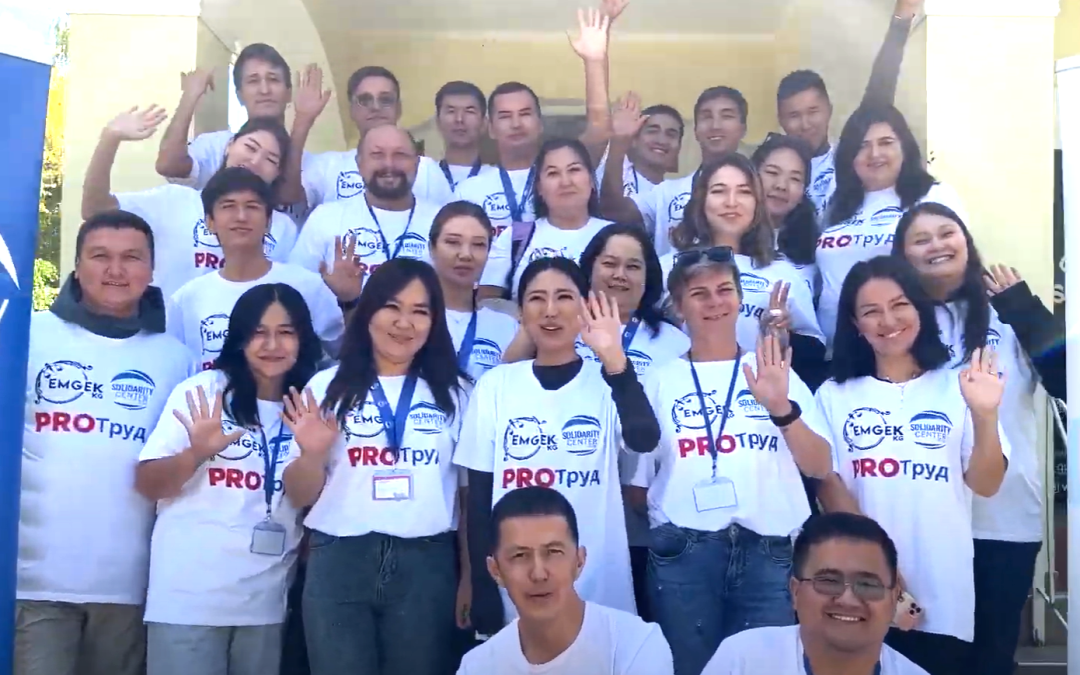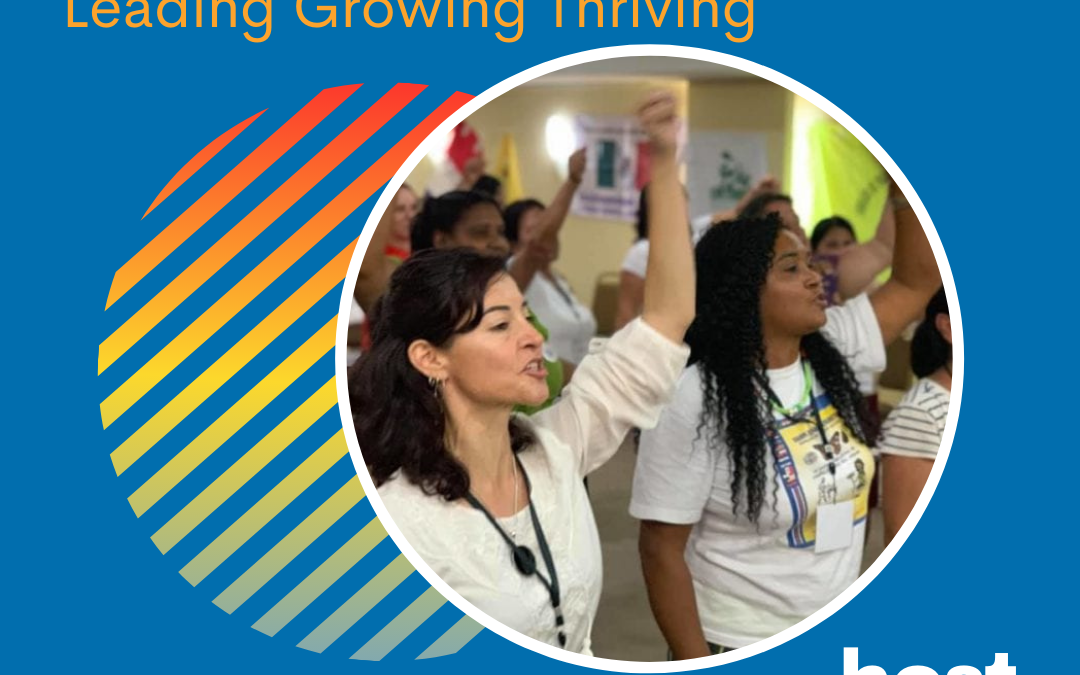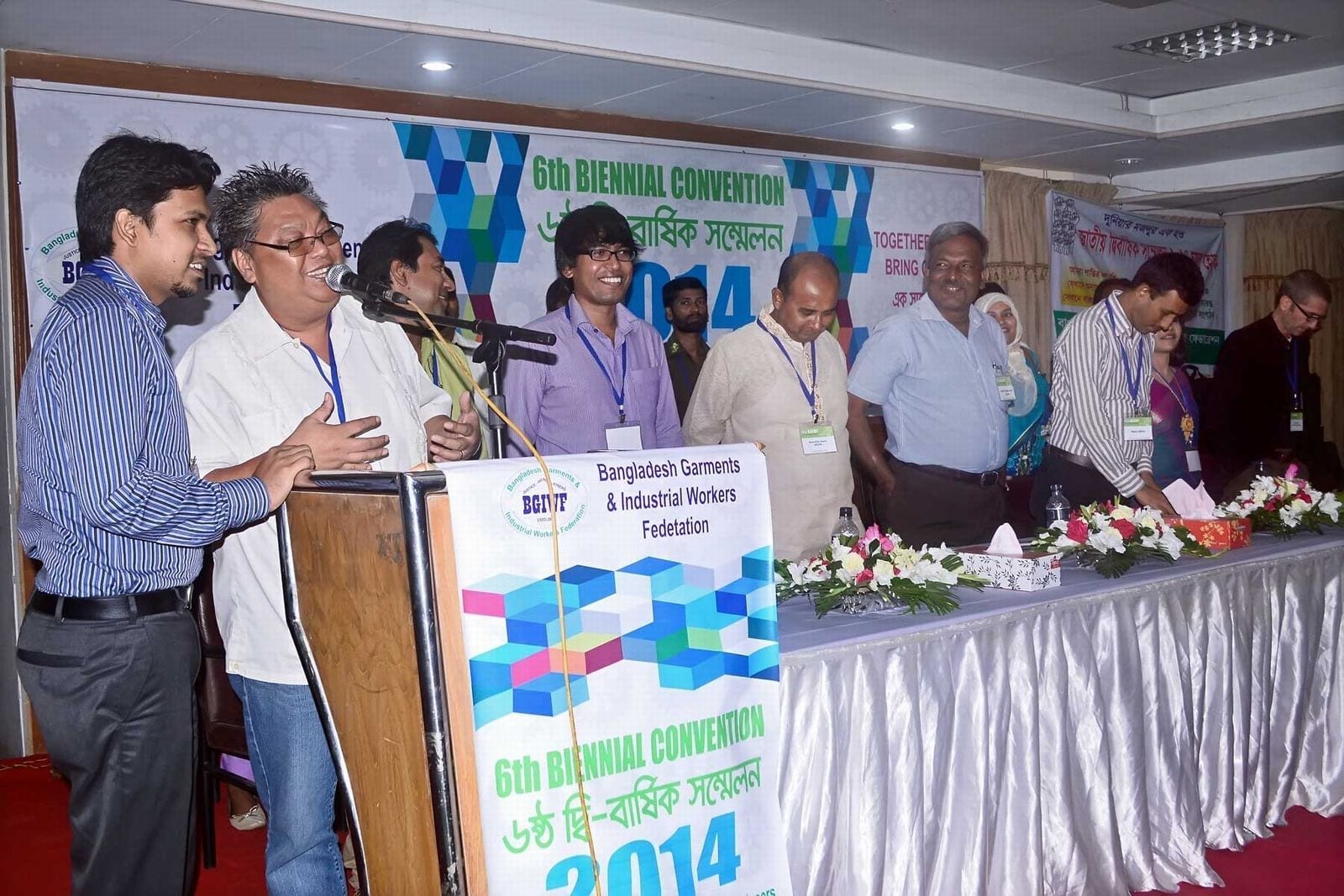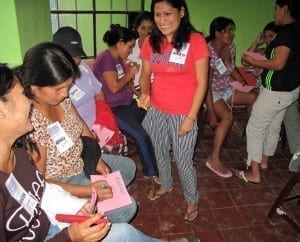
Sep 24, 2024
Nearly two dozen participants from three countries joined in a recent leadership seminar in Issyk Kul, Kyrgyzstan, to discuss strategies for labor relations in inspectorates, unions and NGOs to fight labor corruption.

The seminar provided a deep understanding of basic labor rights and enabled participants to apply valuable lessons. Credit: Solidarity Center
“I didn’t know that this was such a relevant topic,” said Eshmurodova Sevara, a participant from Uzbekistan. “Corruption exists in our everyday life. As a student, I would like less of it in my life.”
The seminar provided a deep understanding of fundamental labor rights and also enabled participants to apply valuable lessons by utilizing effective tools to combat such corruption in labor as misappropriated funds, or personal gain at the expense of workers.
The regional seminar, part of a Solidarity Center school that facilitator Mukha Kazakhstan described as “very high,” builds on the success of the Annual School of Young Leaders in Kyrgyzstan, a country-wide program launched in 2019. The first Regional Youth School involved civil society and union members and leaders from Kazakhstan, Kyrgyzstan and Uzbekistan.
Combining practical learning, including simulation exercises and gamification, the hands-on activities enabled participants to better understand the role of key institutions in addressing corruption in labor relations. (A video captures some of interactivity.)
Aliya Narbai, a participant from Kazakhstan, said he not only gained valuable insights, but practical tools he can apply. “After returning to Kazakhstan, I plan to initiate a campaign to raise public awareness about labor rights and corruption,” he said.
Equipped to Go Forward
“The school showed us how similar our challenges are. Now, we understand that we must act together, combining our efforts,” said Umar Zhaliev, a representative of the Federation of Trade Unions of Kyrgyzstan.
The program’s primary goal—to equip young leaders with the knowledge and tools to take action—developed through sessions in which participants created action plans to implement after returning to their countries. Through an emerging youth activist network, participants can develop mutual support and collaboration to advance labor rights and combat corruption throughout the region.
“Organizing the youth school on labor rights was vital because it empowered young people with essential knowledge and fostered community engagement,” says Solidarity Center country program director Lola Abdukadyrova. “By equipping them with this knowledge, we’re nurturing informed advocates who can effectively engage in labor rights discussions and drive positive change in their communities.”
As Sevara said, when I return “to my home city, I will try to study it even more deeply in order to eradicate it, at least in small parts.”

Apr 14, 2021
Domestic workers are among the most invisible workers in the world—yet in Latin America, they are joining together to champion their rights at their workplace and in their communities, says Adriana Paz Ramirez on this week’s episode of The Solidarity Center Podcast.
Paz, Latin American regional coordinator for the International Domestic Workers Federation (IDWF), says these mostly Black and Indigenous women are breaking decades of intergenerational oppression and trauma, and forging new paths through holistic leadership training, creating community-wide social movements and expanding their strength by connecting with each other.
Within six months of a recent leadership training, for example, 9,000 new members signed up with 26 organizations, Paz tells host Shawna Bader-Blau, Solidarity Center executive director.
“I was so touched by a domestic worker leader who said that I have not been able to give my daughter an inheritance, like money or a house, but I’m giving her this movement. Because this is changing our lives, because this is changing our countries, because this is changing history,” she says.
“That is the significance of getting themselves into a union. If the women at the bottom of the bottom are racing up, all of us are raising up.”
Listen Anytime to The Solidarity Center Podcast
The Solidarity Center Podcast, “Billions of Us, One Just Future,” highlights conversations with workers (and other smart people) worldwide shaping the workplace for the better.
Be sure to catch last week’s episode in which Bader-Blau talks with Francia Blanco, a trans rights activist, domestic worker and union leader in Nicaragua who is working with her union to achieve rights, respect and dignity on the job for all LGBTQ+ workers.
Look for final episode this season on April 21, with International Trade Union Confederation President Ayuba Wabba. He explores the Nigerian labor movement’s response to the COVID-19 crisis and discusses the global labor movement’s plans to build back better for workers around the world
And check out recent episodes:
• LGBTQ+ Domestic Workers Win Rights with Their Union
• Making the Gig Economy Work for Workers
• Winning Rights for Migrant Workers
• Defending Democracy: Workers on the Frontline
• Ending Gender-Based Violence at Work: The Campaign to Ratify ILO C190
This podcast was made possible by the generous support of the American people through the U.S. Agency for International Development (USAID) under Cooperative Agreement No.AID-OAA-L-16-00001 and the opinions expressed herein are those of the participant(s) and do not necessarily reflect the views of USAID/USG.

Sep 16, 2014
Some 600 factory-level garment union leaders and workers from 35 factories met during the recent Bangladesh Garments and Industrial Workers Federation (BGIWF) Convention in Dhaka, the Bangladesh capital.
Joining together under the convention theme, “Together we can bring change,” participants described the workplace improvements that followed after workers formed unions.
“Before forming the union, the workers were abused in different ways. For instance, if the production target was not fulfilled, management terminated them,” said Md. Khokhon Skikdar, general secretary of Lufa Garments Ltd. “But now, they (the managers) value us and hold mutual discussions.”
Tania Akhter, general secretary, Luman Fashion Workers Union, said before workers formed a union at Luman, “if any worker could not fulfill the production target, management forced them to work without any payment.” Now with union representation, “they receive earned leave pay, maternity leave and overtime wages due them as guaranteed by the labor law of Bangladesh. They are ensured of their rights after getting involved with union activities in the factory.”
Through their union, workers have achieved concrete workplace improvements “which were quite impossible earlier,” said Salma Akhter, joint general secretary of Winy Apparels Workers Union. “After forming a union, we increased our evening shift bill and got maternity leave.”
Participants also said the sixth annual BIGUF convention enabled them to expand their knowledge and skills and network with their peers.
“This type of convention gives us an opportunity to meet other union leaders and to get closer to each other,” said Skikdar. “Not only the leaders joined the program but also the members of the union were here.”
Mim Akhter, general secretary of the Dress and Domestic Workers Union, said she learned a lot speaking with other union leaders and now plans to “spread that knowledge among the general workers of the factory.”
Mim took part in training programs where she said she gained helpful knowledge, especially “how to deal with management” and “what is good and bad for the workers.”
Tania Akhter said the convention allowed factory leaders the meet and discuss mutual issues. “I feel very happy after seeing lots of workers together under one roof. As a leader, I am always trying to play a significant role in establishing worker rights,” she said.
Alonzo Suson, Solidarity Center Bangladesh country program director, IndustriALL’s Roy Ramesh and Rob Wayss, from the Bangladesh Accord on Fire and Building Safety, attended the convention as guests.
Unions participating included: Rokhsana Knit and Composite Workers Union; Miti Apparels Ltd. Workers Union; Fashion Island; Lucid Apparels Ltd. Workers Union; Lyric Industrial Workers Union; M F Apparels Workers Union; B Brothers Workers Union; Natural Apparels Ltd. Workers Union; Style Fashion Workers Union; BP Garments Workers Union; Essex Ltd. Workers Union; Four S Apparels Workers Union; Jisas Fashion Workers Union, Solar Garments; Super Shine Apparels Ltd. Workers Union; Workers Union; GNG Fashion and Fabrics Ltd. Workers Union; Overseas; Mega Star Apparels Ltd. Workers Union; Green Granite; Apollo Swing and Garments Ltd. Workers Union; New Morning Apparels Ltd. Workers Union; Global Knitwear Workers Union; Isabpur Workers Union; Aramic (Cement) Workers Union; Lokhipur Chingripona (Shrimp) Workers Union; Grameenphone union; and the Dockyard Union.
Mar 10, 2014

Violeta co-facilitated a workshop after learning skills from a Solidarity Center-sponsiored training. Credit: Samantha Tate
Rosa Pérez was brought to Lima, Peru, from the country’s Northern Sierra when she was a child to work as a domestic worker. As a young adult, she moved to the farming region of La Libertad to make her own way as an agricultural laborer. Thirty years, four children and five grandkids later, Perez has become a bold advocate for her co-workers. She encourages them to document and speak out about problems such as sexual harassment and inadequate safety and protection equipment and training.
Pérez, secretary of Women’s, Child and Adolescent Affairs of the Camposal Workers’ Union (Sindicato de Trabajadores de la Empresa Camposal), is a leader in a Solidarity Center program to empower women farm workers in Peru. Since 2009, the program, which includes the National Federation of Farm Workers (Federación Nacional de Trabajadores de la Agroindustria y Afines, FENTAGRO), has involved training and advocacy activities with unions representing workers in export-oriented agriculture.
The initiative gained momentum after Pérez traveled to São Paulo, Brazil, last year to participate in the Solidarity Center conference, “Women’s Empowerment, Gender Equality and Labor Rights: Transforming the Terrain.” There, she addressed more than 100 women from around the world and described working conditions for women farm workers in Peru and the actions that her union and FENTAGRO are taking to build a better life for women like her daughter, who works alongside her.
Pérez took the strategies she learned from activists at the conference to the farm worker federation’s leadership Friday, the eve of International Women’s Day. Along with the Solidarity Center, Pérez is recommending that La Libertad’s three unions meet with regional government officials and possibly employers to advocate for literacy programs targeting working women. She also plans to propose an awareness-raising campaign for men and women about sharing domestic and family care. The Solidarity Center has also been working with unions to strengthen their arguments for collective bargaining with employers in support of maternity and breastfeeding benefits that are codified in Peruvian law but not generally enforced.
Following the Women’s Empowerment conference, Perez worked with the Solidarity Center to identify 12 dynamic women from three export-oriented agriculture farms to take part in a Solidarity Center training this year geared toward building women’s confidence and strengthening their leadership skills so they can effectively advocate for women workers’ issues within their unions, their workplaces and their communities.
One of the workers who joined the training, Apolonia, is an elected officer in the Union of Agrícola Viru Workers (Sindicato de Trabajadores de la Empresa Sociedad Agrícola Virú, SITESAV). She grows and harvest fruits and vegetables as part of Peru’s export-agriculture industry, which, in 2013, generated $33 million in exports to the United States. She advises her fellow co-workers, especially young women, about how to stay healthy and build strong families while working between 12 hours and 14 hours a day and earning an average daily wage of $12.
Apolonia and other participants in the two-day training discussed how they can improve workplace safety and other issues and shared their dreams about bettering their workplaces, unions and households.
Two weeks after the leadership training, nearly all of the women who participated in the workshop, including Violeta and María Luna, who had been reluctant to speak in public, co-facilitated small workshops with groups of their peers using the new techniques they learned from the Solidarity Center training, including public speaking and one-on-one-contact to encourage self-confidence and participation.
The La Libertad network of women farm workers now has a compact disk with the stories of 32 Peruvian women leaders they can share in small study circles or at worker assemblies and when training other groups of women. It is the beginning of a much longer process that already has helped a group of powerful women to find their voice and begin to use it.





